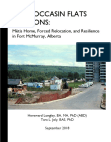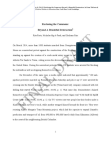On Freedom, Love, and Power
By Jacques Ellul. Ed./trans. Willem H. Vanderburg
Toronto: University of Toronto Press, 2010.
247 pp. ISBN 978-1-4426-1117-7
Reviewed by Ben Kautzer
Though marginalized in certain academic circles, Jacques Ellul (1912-1994)
undoubtedly remains one of the most significant social critics of the 20th
century. A prolific writer, Ellul produced 48 books and well over 600 articles in which he critiqued the hegemonic power of technology in contemporary society and its corrosive impact on human life, culture, ecology, and religious faith.
Fueled by a reductive scientism and undergirded by a mythos of insatiable progress, modernity has inaugurated a seismic shift towards what Ellul calls
la technique
—an unquestioned technical totality that underlies, orients, and mediates all human relationships with others and the environment. As the secular religion of the modern age,technique, argues Ellul, has indeed become our new environment—the life milieu of humanity.
Fueled by a reductive scientism and undergirded by a mythos of insatiable progress, modernity has inaugurated a seismic shift towards what Ellul calls
la technique
—an unquestioned technical totality that underlies, orients, and mediates all human relationships with others and the environment. As the secular religion of the modern age,technique, argues Ellul, has indeed become our new environment—the life milieu of humanity.
His iconoclastic work in history, sociology, politics, and theology seeks to call into question the pervasiveness of this technological mindset and its implications for our ability to conceive human flourishing (in both the physical and spiritual sense of the word).
It should come as no surprise that Ellul’s work provided a foundational point of departure for questions Ivan Illich wrestled with throughout his own life.
It should come as no surprise that Ellul’s work provided a foundational point of departure for questions Ivan Illich wrestled with throughout his own life.













































